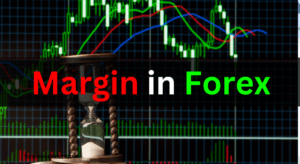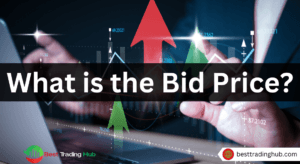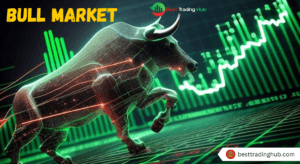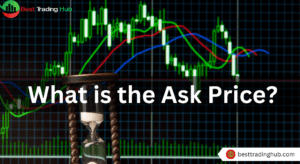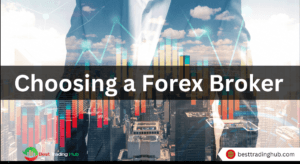When it comes to choosing a Forex broker, making the right decision is crucial for your success as a trader. A reliable broker will provide you with access to the market, competitive spreads, and a secure trading environment, while an unreliable one could result in unnecessary risks and poor execution. With so many brokers available, selecting the one that aligns with your trading needs and goals is an essential first step in your Forex journey.
As you evaluate different brokers, there are several factors to consider, including regulatory status, trading platforms, spreads, and leverage. By carefully examining these aspects, you can ensure that you’re working with a broker that offers the right balance of security and tools to support your trading strategy. This guide will help you navigate the complexities of choosing a Forex broker by highlighting the key criteria to keep in mind.
Table of Contents
What Are the Most Important Factors When Choosing a Forex Broker?
When choosing a Forex broker, there are several critical factors to consider to ensure you’re working with a broker that aligns with your trading goals and risk tolerance. These factors directly affect your trading experience and the profitability of your trades.
1. Regulation and Security
The broker’s regulatory status is one of the most important factors to evaluate. Reputable brokers are regulated by well-known authorities such as the Financial Conduct Authority (FCA) in the UK, CySEC in Cyprus, or the Commodity Futures Trading Commission (CFTC) in the US.
- Why It Matters: Regulation ensures that the broker operates within a framework designed to protect traders and maintain the integrity of the financial markets.
- How to Verify: Always verify a broker’s license on the regulator’s official website.
2. Trading Costs: Spreads and Commissions
Forex brokers make money through spreads (the difference between the buy and sell prices) and commissions. Low spreads and commissions are crucial for traders, especially those who trade frequently or scalp the market.
- Fixed vs. Variable Spreads: Some brokers offer fixed spreads, while others provide variable spreads that change depending on market conditions.
- Commissions: Some brokers charge a commission per trade in addition to spreads, so it’s important to compare these costs.
3. Leverage and Margin Requirements
Leverage allows traders to control a larger position with a smaller amount of capital, but it also increases risk. Different brokers offer varying levels of leverage.
- Leverage Options: Some brokers offer leverage as high as 1:500, while others cap it at 1:30 due to regulatory restrictions.
- Risk Factor: High leverage can amplify both gains and losses, so choose a leverage level that matches your risk appetite.
How to Evaluate the Regulatory Status when Choosing a Forex Broker?
Evaluating the regulatory status when choosing Forex broker is crucial for ensuring that your funds are protected and that the broker follows legal and ethical standards. Regulated brokers are required to adhere to strict financial practices, safeguarding your investments.

1. Check the Broker’s Licensing
Choosing a Forex brokers who must be licensed by regulatory authorities to operate legally. Some of the most reputable regulatory bodies include:
- Financial Conduct Authority (FCA) – UK
- Australian Securities and Investments Commission (ASIC) – Australia
- Cyprus Securities and Exchange Commission (CySEC) – Europe
Always check the broker’s website for their registration number, and cross-check it with the regulator’s website to confirm the validity of the license.
2. Why Regulation Matters
- Investor Protection: Regulated brokers must adhere to rules that protect traders, such as segregating client funds from company funds.
- Financial Stability: Regulatory bodies ensure that brokers meet specific financial standards, reducing the risk of the broker going bankrupt and losing your funds.
3. Red Flags to Avoid
- Offshore Brokers: Be cautious of brokers registered in unregulated or lightly regulated jurisdictions such as Belize or Seychelles.
- Lack of Transparency: If a broker doesn’t provide clear information about its regulatory status, it’s a significant warning sign.
What is the Difference Between ECN, STP, and Market Maker Brokers?
Understanding the differences between ECN, STP, and Market Maker brokers can help you choose the broker that best suits your trading style. These models dictate how brokers execute your trades and can impact factors like pricing and order execution.
1. ECN Brokers (Electronic Communication Network)
ECN brokers connect traders directly to the interbank market without dealing desks. They aggregate quotes from various liquidity providers to offer the best available price.
- Pros: Lower spreads, direct access to market liquidity, transparent pricing.
- Cons: ECN brokers often charge commissions per trade, which can increase overall trading costs.
2. STP Brokers (Straight Through Processing)
STP brokers automatically route traders’ orders to their liquidity providers without passing through a dealing desk. They act as intermediaries but still provide competitive spreads.
- Pros: No dealing desk intervention, faster execution, competitive spreads.
- Cons: Spreads may widen during periods of high market volatility.
3. Market Maker Brokers
Market makers create their own market by quoting both the buy and sell prices for a currency pair. They take the opposite side of your trade and profit from the spread.
- Pros: Fixed spreads, guaranteed liquidity.
- Cons: Potential conflict of interest, as the broker profits when you lose.
Which Broker Type Should You Choose?
- ECN and STP brokers are generally preferred by more experienced traders looking for tighter spreads and faster execution.
- Market makers are often suitable for beginner traders due to their fixed spreads and guaranteed liquidity, but they may present higher costs in the long term.
How Do Spreads and Commissions Impact Your Trading Costs with a Forex Broker?
Spreads and commissions are two of the primary ways Forex brokers make money, and they directly impact your trading costs. Understanding how they work and how they affect your profits is essential when choosing a Forex broker.
1. Understanding Spreads
The spread is the difference between the bid (buy) and ask (sell) price of a currency pair. This is essentially the broker’s fee for executing your trade. Spreads can be either fixed or variable:
- Fixed Spreads: Fixed spreads remain the same regardless of market volatility. This is beneficial during times of high market fluctuations, as you won’t be affected by sudden increases.
- Variable Spreads: Variable spreads fluctuate depending on market conditions, often widening during periods of volatility or low liquidity.
2. Commissions
Some brokers charge a commission per trade, in addition to the spread. This is more common with ECN brokers, where traders can benefit from lower spreads but pay a small fee for each transaction.
- Impact on Scalpers: Traders who make frequent trades, such as scalpers, need to consider both spreads and commissions, as high trading costs can eat into profits.
- Flat Fees or Percentages: Some brokers charge a flat fee per trade, while others take a percentage based on the size of the trade.
How to Minimize Trading Costs:
- Choose a Broker with Tight Spreads: Look for brokers that offer competitive, tight spreads, especially during normal market conditions.
- Check the Commission Structure: If you trade frequently, consider brokers with low or no commissions to minimize costs.
Why Is Leverage Important and How Does It Vary Across Forex Brokers?
Leverage is a key feature in Forex trading, allowing traders to control larger positions with a smaller amount of capital. While leverage can amplify profits, it also increases risk, making it important to understand how leverage works and how it varies across brokers.
1. What Is Leverage?
Leverage allows traders to borrow capital from their broker to increase their market exposure. For example, with 1:100 leverage, you can control a position of $10,000 with just $100 of your own money. However, leverage magnifies both gains and losses.
- High Leverage: Some brokers offer leverage as high as 1:500 or more, providing traders with significant buying power.
- Low Leverage: Regulated brokers in regions like Europe often cap leverage at 1:30 or 1:50 for retail traders due to risk concerns.
2. Risks of Using Leverage
While leverage can boost profits, it also increases the risk of significant losses, especially for inexperienced traders.
- Margin Calls: If the market moves against your position, you may receive a margin call, requiring you to deposit additional funds or close your position.
- Risk Management: It’s essential to use leverage responsibly, combining it with proper risk management strategies like stop-loss orders to minimize potential losses.
Choosing the Right Leverage:
- New Traders: For beginners, it’s wise to start with lower leverage (1:10 to 1:30) to minimize risk.
- Experienced Traders: Advanced traders might opt for higher leverage (1:100 or higher) if they have a solid risk management plan in place.
How to Assess the Trading Platforms and Tools Offered by Forex Brokers?
A trading platform is your gateway to the Forex market, and the features it offers can significantly influence your trading experience. The best brokers offer user-friendly platforms equipped with powerful tools for analysis, order execution, and risk management.
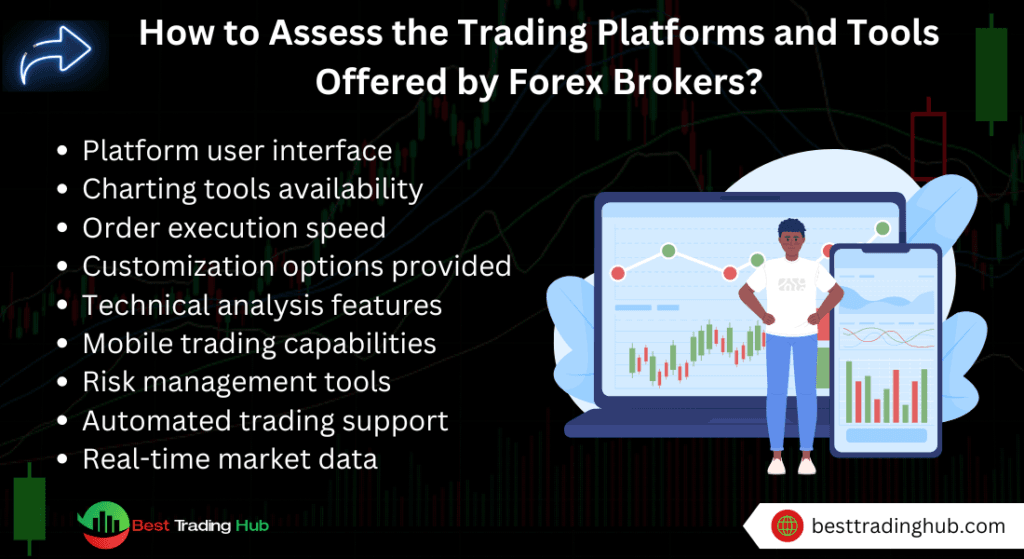
1. Popular Trading Platforms
Choosing a Forex brokers who provide access to industry-standard platforms, as well as proprietary platforms designed specifically for their clients.
- MetaTrader 4 (MT4) and MetaTrader 5 (MT5): These are the most widely used platforms in Forex trading, offering a range of features including automated trading, advanced charting tools, and multiple order types.
- cTrader: Another popular platform known for its clean interface and direct market access (DMA) trading capabilities. It’s often preferred by ECN traders.
2. Key Features to Look For:
When assessing a broker’s trading platform, consider the following:
- Charting Tools: Advanced charting capabilities are essential for technical analysis. Look for platforms that offer a wide range of technical indicators, drawing tools, and multiple timeframes.
- Order Execution Speed: The speed at which your orders are executed can have a significant impact on your trades, especially in a fast-moving market. Make sure the platform offers fast and reliable execution.
- Mobile Trading: Many brokers now offer mobile versions of their platforms, allowing you to trade on the go.
Choosing a Platform That Matches Your Trading Style:
- Beginner Traders: Look for a platform with a simple, intuitive interface and educational resources to help you learn.
- Advanced Traders: Focus on platforms that offer advanced features like automated trading (Expert Advisors), customizable indicators, and multiple order types.
What Are the Available Account Types and Which One Should You Choose?
Forex brokers typically offer different account types to cater to various trading styles and levels of experience. Understanding these account types will help you choose the best option based on your trading needs, capital, and risk tolerance.
1. Standard Account
The standard account is the most common type offered by brokers and is suitable for most traders.
- Minimum Deposit: Usually requires a medium to high minimum deposit (e.g., $100 to $1,000).
- Leverage and Spreads: Offers moderate leverage (e.g., 1:50 to 1:100) and competitive spreads, though they may vary depending on market conditions.
2. Mini and Micro Accounts
For traders with limited capital or those who want to practice with smaller amounts, mini and micro accounts are ideal.
- Mini Accounts: Allow you to trade smaller lot sizes, typically 1/10th the size of a standard lot, reducing risk and capital requirements.
- Micro Accounts: Even smaller than mini accounts, micro accounts offer even lower lot sizes (1/100th of a standard lot), making them perfect for beginners or those testing new strategies with minimal risk.
3. ECN and VIP Accounts
ECN (Electronic Communication Network) accounts are popular among professional and high-volume traders.
- Lower Spreads: ECN accounts often offer tighter spreads and direct access to the interbank market but charge a commission per trade.
- VIP Accounts: Some brokers also provide VIP accounts for high-net-worth individuals, offering enhanced features like personal account managers and lower trading costs.
What Deposit and Withdrawal Methods Should You Look when choosing a Forex Broker?
Having reliable and efficient deposit and withdrawal methods is critical when choosing a Forex broker. The process should be seamless, secure, and offer flexibility in terms of payment options.
1. Common Deposit Methods
- Bank Transfers: Direct bank transfers are one of the most secure methods but can take several business days to process.
- Credit/Debit Cards: Most brokers accept payments via major credit and debit cards (e.g., Visa, MasterCard), which are faster than bank transfers and often process instantly.
- E-Wallets: Services like PayPal, Skrill, and Neteller are becoming increasingly popular due to their speed and convenience, allowing for near-instant deposits.
2. Withdrawal Policies
Withdrawal policies can vary widely between brokers, so it’s important to check the details before opening an account.
- Processing Time: Some brokers process withdrawals within 24 hours, while others may take 3-5 business days, depending on the method used.
- Fees: Be aware of any withdrawal fees, as some brokers may charge for certain methods like bank transfers or international transactions.
Key Considerations for Deposits and Withdrawals:
- Speed of Transactions: Look for brokers with quick deposit and withdrawal times, especially if you’re an active trader.
- Low Fees: Compare brokers based on deposit and withdrawal fees, especially if you plan to move funds frequently.
- Supported Currencies: Ensure the broker supports your local currency to avoid exchange fees.
How Important Is Customer Support When choosing a Forex Broker?
When trading Forex, reliable customer support can make a significant difference in your overall experience. Whether you encounter issues with your account, platform, or trades, having access to responsive customer service can help resolve problems quickly.
1. Availability of Support
Choosing a Forex brokers who offer 24/5 or 24/7 customer support, ensuring assistance is available during market hours. Consider brokers that provide multiple support channels, including:
- Live Chat: Ideal for immediate, real-time support.
- Phone Support: Useful for more complex issues that require in-depth explanations.
- Email: Best for non-urgent queries that don’t require instant responses.
2. Multilingual Support
For international traders, multilingual support is crucial. Many brokers offer customer service in multiple languages to cater to a global audience, ensuring you can communicate clearly and effectively.
3. Responsiveness and Quality
- Response Time: Look for brokers with fast response times, especially via live chat or phone.
- Expertise: Ensure the customer service representatives are knowledgeable and can assist with technical issues, trading problems, or platform guidance.
Why Customer Support Matters:
- Problem Resolution: Effective support helps resolve issues like platform errors or withdrawal delays quickly, reducing downtime.
- Confidence: Knowing you have reliable support builds trust and confidence in the broker, especially when dealing with large amounts of capital.
What Trading Instruments and Currency Pairs Should a Good Forex Broker Offer?
When choosing a Forex broker, it’s essential to consider the range of trading instruments and currency pairs they offer. A diverse selection allows you to expand your trading opportunities and adapt to different market conditions.
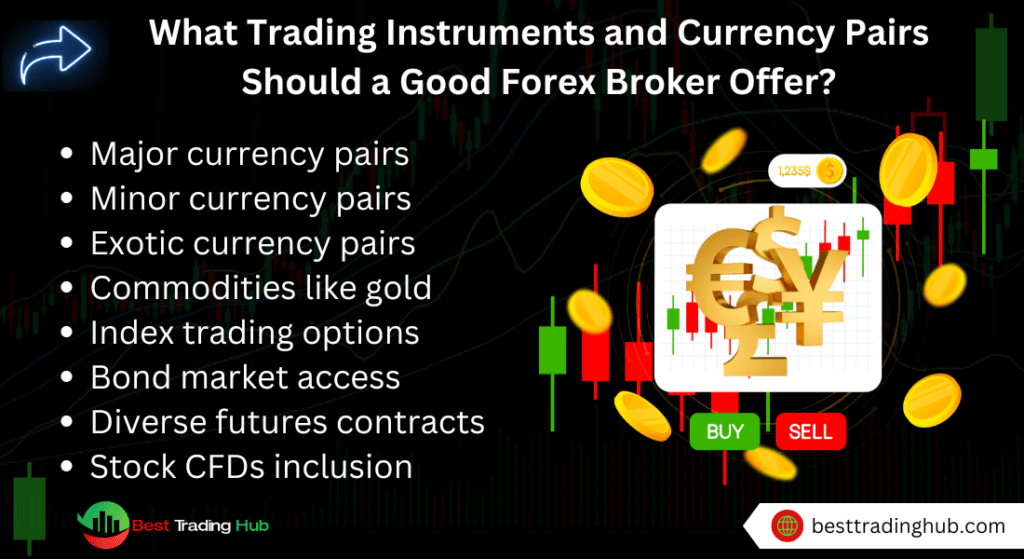
1. Major, Minor, and Exotic Currency Pairs
Choosing a Forex broker who should offer a wide range of currency pairs, allowing traders to access different markets. Currency pairs are generally categorized into three types:
- Major Pairs: These are the most traded pairs, including EUR/USD, GBP/USD, and USD/JPY. They offer high liquidity and lower spreads.
- Minor Pairs: These involve major currencies but exclude the US dollar, such as EUR/GBP or AUD/JPY.
- Exotic Pairs: Exotic pairs include one major currency and one from an emerging market, such as USD/TRY (US Dollar/Turkish Lira). These pairs have higher volatility and wider spreads, but they also offer unique trading opportunities.
2. Additional Trading Instruments
In addition to currency pairs, top choosing a Forex brokers that also offer a variety of other financial instruments to diversify your trading portfolio:
- Commodities: Gold, oil, and silver are popular trading instruments that allow you to hedge against currency fluctuations.
- Indices and Stocks: Some brokers provide access to major stock indices like the S&P 500 or DAX, as well as individual company stocks.
- Cryptocurrencies: As digital assets grow in popularity, more brokers are offering cryptocurrency trading, with popular pairs such as BTC/USD (Bitcoin/US Dollar).
How to Check a Broker’s Reputation and Avoid Scams?
Checking a broker’s reputation is a crucial step in ensuring you avoid scams and fraudulent brokers in the Forex market. A broker’s credibility and trustworthiness directly affect your trading experience, and you should always research thoroughly before committing funds.
1. Online Reviews and Community Feedback
One of the most effective ways to gauge a broker’s reputation is by looking at reviews and feedback from the trading community. Trusted sources include:
- Forex Trading Forums: Websites like ForexPeaceArmy or BabyPips offer forums where traders share their experiences with different brokers.
- Social Media: Platforms like Twitter or Facebook can provide real-time feedback on brokers, especially if they engage with their clients transparently.
2. Regulatory History
Another way to check a broker’s reputation is by researching their regulatory history. Reputable brokers will be transparent about any past sanctions or disputes with regulatory bodies.
- Regulatory Websites: You can search for the broker on the official website of their regulator (e.g., FCA, ASIC, CySEC) to verify any legal issues or customer complaints.
Red Flags to Watch Out For:
- Unrealistic Offers: Be cautious of brokers that promise extremely high returns or bonuses, as these are often tactics used by scam brokers.
- Poor Customer Reviews: Consistent negative reviews, especially around issues like withdrawal delays or sudden platform outages, are warning signs.
What Role Does Trading Education and Research Play in Selecting a Broker?
Choosing a Forex broker that offers comprehensive trading education and research tools can greatly enhance your trading performance, especially if you’re a beginner. These resources help you stay informed about market movements and improve your trading strategies.
1. Educational Resources
Top brokers provide various educational materials to help traders develop their skills and understand market dynamics. These resources often include:
- Webinars and Tutorials: Live or recorded webinars hosted by trading experts that cover topics such as technical analysis, risk management, and trading strategies.
- Ebooks and Courses: Many brokers offer free or paid ebooks and online courses designed to help traders at all levels, from beginners to advanced professionals.
- Demo Accounts: A demo account allows you to practice trading with virtual money in a real-market environment, enabling you to test strategies without risking capital.
2. Research Tools
A good broker will also offer research tools to help you make informed decisions. These tools typically include:
- Economic Calendars: An economic calendar provides key market events, such as interest rate decisions or employment data, that can affect currency values.
- Market Analysis Reports: Brokers often provide daily or weekly market reports that offer insights into market trends and price forecasts.
Why Education and Research Matter:
- Continuous Learning: The Forex market is dynamic, and even experienced traders need to stay up-to-date with new strategies and market developments.
- Informed Trading Decisions: By accessing reliable research and educational resources, you can make more informed decisions, minimizing risk and maximizing potential returns.
What Are the Pros and Cons of Using High Leverage Forex Brokers?
Leverage is a critical aspect of Forex trading, allowing traders to control larger positions with less capital. While high leverage can amplify profits, it also increases risk, making it essential to weigh the pros and cons before choosing a broker that offers high leverage.
1. Pros of High Leverage
- Amplified Profits: High leverage (e.g., 1:500 or higher) allows traders to generate significant profits from relatively small price movements. This can be particularly useful for traders with limited capital who want to maximize their market exposure.
- Lower Capital Requirements: With high leverage, you can open larger positions with a smaller initial investment. This makes Forex trading more accessible to retail traders.
2. Cons of High Leverage
- Increased Risk: The most significant downside of high leverage is the potential for amplified losses. Even a small unfavorable price movement can lead to significant losses, especially if proper risk management tools like stop-loss orders are not used.
- Margin Calls: If the market moves against you, the broker may issue a margin call, requiring you to deposit more funds or close your position to avoid further losses. This can quickly deplete your account balance.
Should You Choose a High Leverage Broker?
- Experienced Traders: High leverage is best suited for experienced traders with a well-defined risk management strategy.
- New Traders: Beginners should start with lower leverage to minimize risk while they learn how to navigate the market effectively.
How Can a Forex Broker’s Margin Requirements Affect Your Trading Strategy?
A broker’s margin requirements determine the minimum amount of capital you must have in your account to open and maintain a position. Understanding how margin works and how it affects your trading strategy is crucial for managing risk.
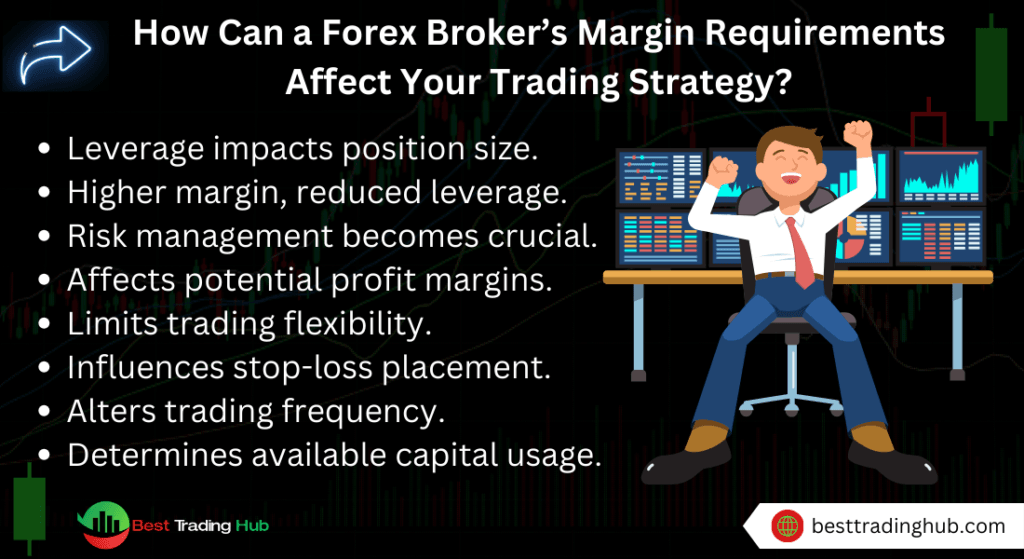
1. What Are Margin Requirements?
Margin is the amount of money a broker requires you to deposit in order to open a leveraged trade. It is usually expressed as a percentage of the total trade size. For example, a broker might require a 1% margin for a position, meaning you must deposit $1,000 to control a $100,000 position.
- Impact on Leverage: Higher margin requirements limit the amount of leverage available to you. For instance, if the margin requirement is 1%, you can use leverage up to 1:100.
2. How Margin Affects Your Trading Strategy
- Smaller Positions: Brokers with high margin requirements may limit your ability to open larger positions, affecting your potential profits.
- Risk Management: Trading on margin can be risky because a small price movement against your position may lead to a margin call. It’s important to ensure that you have sufficient capital to meet the broker’s margin requirements to avoid having your positions closed prematurely.
Key Considerations for Margin Requirements:
- Understand Leverage Limits: Higher margin requirements mean less available leverage, which could affect your trading style.
- Plan for Volatility: Ensure your trading strategy accounts for potential market volatility and unexpected margin calls, particularly in highly leveraged trades.
What Additional Features Should You Look for When Choosing a Forex Broker?
While regulatory status, spreads, and leverage are the primary considerations when choosing a Forex broker, additional features can enhance your overall trading experience. Some brokers offer unique tools and perks that can be beneficial, especially for more advanced traders.
1. Risk Management Tools
A good broker will provide risk management tools to help you protect your trades and manage exposure effectively.
- Stop-Loss and Take-Profit Orders: These tools allow you to automatically exit a trade when the price reaches a specific level, ensuring that you cap your losses and lock in profits.
- Trailing Stops: A trailing stop follows the market price as it moves in your favor, allowing you to lock in gains while minimizing losses if the market reverses.
2. Automated Trading and Expert Advisors
Some brokers, especially those offering MetaTrader 4 (MT4) or MetaTrader 5 (MT5), allow you to use Expert Advisors (EAs) for automated trading.
- Automated Strategies: EAs can execute trades based on pre-set conditions, eliminating the need for manual intervention and allowing you to trade 24/7.
- Backtesting: Many platforms offer backtesting features, allowing you to test your strategies on historical data before applying them in live markets.
3. Bonuses and Promotions
While not essential, some brokers offer bonuses and promotions to attract new clients. These can include deposit bonuses, cashback offers, or reduced trading costs for high-volume traders.
- Caution: Be cautious when choosing a broker based solely on bonuses, as some may have unfavorable terms and conditions, such as high withdrawal thresholds or hidden fees.
Conclusion
In conclusion, choosing a Forex broker is a crucial step for any trader looking to succeed in the currency markets. By considering factors such as regulatory status, trading platforms, spreads, and customer support, you can ensure that you’re partnering with a broker that aligns with your trading style and goals. Whether you’re a beginner or an experienced trader, selecting the right broker can make a significant difference in your trading performance and overall experience.
It’s also important to understand broader market conditions, such as the implications of a bear market, which can affect trading strategies and decision-making. In a bear market, traders may rely more on risk management tools and seek brokers with tight spreads and fast execution to navigate volatile conditions. Combining the right broker with a deep understanding of market phases like bear markets ensures that you are well-equipped to trade effectively in any market environment.






